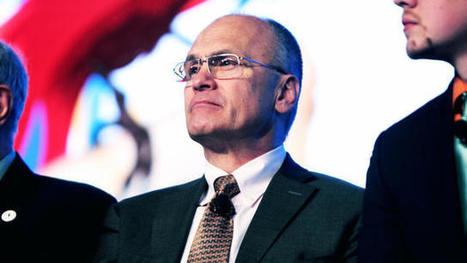 Your new post is loading...
 Your new post is loading...
All the data suggesting that coding is rapidly becoming an essential skill for any job–not just one in tech–only tells one side of the story. The other side indicates that soft skills such as critical thinking, problem solving, attention to detail, and writing proficiency top the list of what hiring managers find missing from job seekers’ personal tool kits. But according to theWorld Economic Forum’s Future of Jobs Report, one the job skills that will make a candidate competitive in the job market of the future is emotional intelligence. The WEF predicts it will be among the top ten in 2020. How emotionally intelligent are you now? There are several ways to test it (including one that’s so accurate it’s creepy). The good news is that even if you’re a bit deficient on some traits, emotional intelligence can be improved. Here are some suggestions on boosting your EQ right away.
Via The Learning Factor
Millennials are starting to take control in the workplace. There are now more than 75 million millennials in the workforce, more than baby boomers (just shy of 75 million) and Gen Xers (66 million). Now entering their late 20s and early 30s, the oldest members of the generation are starting to take more leadership positions in major organizations. Despite the fact that millennials are sporting one of the lowest rates of entrepreneurship in 25 years, 60% see themselves as entrepreneurs, and 90% recognize entrepreneurship as a mindset. Combined with their natural tendencies toward independent thought and mild to moderate anti-establishment vibes, this is making millennials a strong force of direction and leadership—and an even stronger one to come in the next several years.
Via The Learning Factor
Is it possible to be a high-standards, results-driven leader while at the same time building an engaged, fun-to-work-with team? Many people would contend that doing either of these things well makes it almost impossible to succeed at the other. And yet our examination of 360-degree assessment data from more than 60,000 leaders showed us that leaders who were rated in the top quartile of both skills ranked in the 91st percentile of all leaders. It seems that not only is it possible to do both things well, but the best leaders are the very ones who manage to do both. But there aren’t very many of them — specifically, we isolated leaders who ranked in the top quartile on both driving for results and people skills.
Via The Learning Factor
No matter where you are in your career, it’s only natural to occasionally feel as though there are things you’d like to change. But it’s one thing to say you want to make a change and quite another to actually make it happen. In order to make serious steps toward reinventing yourself, you need to first commit to it and then take action to make those changes a reality. Here are twelve ways you can reinvent yourself at work and in your personal life, backed by science.
Via The Learning Factor
First-time managers often ask themselves how to develop a leadership style that suits them: “Who should I model myself after? What kind of leader should I be?” It’s great to think critically about your approach to managing others, particularly when you’re new to it, but these questions won’t exactly help you. That’s because they assume that leadership is something you try on and show off, a “style” that’s curated and intentional. But especially in the beginning, your style will be based far less on mirroring others’ habits and behaviors and far more on instinct and intuition. And that’s not necessarily a bad thing.
Via The Learning Factor
Running a business is an inherently emotional experience. Even the most stoic leaders are bound to find themselves becoming invested not only in outcomes, but in people and processes as well. While emotional leadership is often regarded as a liability, lack of personal investment can also bring about negative outcomes. I’ve learned that the best leaders are those who can recognize emotionally-charged situations, rise above the passions of the movement, and maintain a level head. Good leaders are quick to listen and slow to anger.
Via The Learning Factor
A few weeks ago, after receiving a 21-page PDF report breaking down my so-called “emotional intelligence,” I did the logical thing and forwarded it to my boyfriend. He glanced at the list of categories on the second page and exclaimed—before reading my results—”Flexibility, uh oh!” The report was the result of an assessment I’d taken three weeks prior called the EQ-i 2.0, which is based on nearly 20 years of research and has been taken by some 2 million people—and sure enough, it told me I’m about as inflexible as people close to me seem to think I am. Shortly afterward I scheduled a call with its developer, Steven J. Stein, who reviewed my results and offered this suggestion: “I would start looking at how you operate—what your routines are, how you get through a day.” When I asked him for an example of a routine I might want to shake up, he said, “Like, eat a different breakfast or something.”
Via The Learning Factor
Flexible jobs, or jobs that can be done remotely, are very common today. A recent Gallup survey found that 43% of American employees spend at least some time working remotely. The nearly half of jobs that can be done remote is no surprise to anyone who has been paying attention, as technology has paved the way for workers to unplug or become location independent. It’s the same reason why millennials are keen to become digital nomads and travel while they work. Employers benefit by having remote employees because their productivity spikes without distractions provided by an office environment. Further, a FlexJobs report found that 82% of millennials said they are more loyal to their employer if they have flexible work options.
Via The Learning Factor
Have you ever heard about someone “cutting the line” to land their dream job? They’re the people getting the perfect position without ever submitting a resume, or negotiating a sweet signing bonus plus five weeks’ vacation, or getting hired for a role the company created just for them. How do they do it? Are they just naturally golden? Or do they know something you don’t? While you might use the word lucky, these folks aren’t necessarily more talented; they’ve simply perfected a way of approaching the job search in a manner others haven’t been trained in (or are fearful of adopting). This out-of-the-box approach gives them a notable advantage when it comes to standing out. So what do they know, and how can you follow their lead to make your next transition not only more quickly, but more successfully as well? Do what they do:
Via The Learning Factor
Learning what drives people’s self esteem can improve interactions among organization members.
Whether you're managing an intern or running an entire business, your employees' success (and your own skin) depends on your leadership. Thankfully, the solution for motivating your team and squashing any issues is right at the tip of your tongue. It all starts with communication -- the skill experts point to as the make-or-break factor for successful leadership. Here are eight things that exceptional bosses tell their employees daily. Start using these daily (or begin looking for a boss who does), and watch your success skyrocket:
Via The Learning Factor
How a person defines success is a subjective thing, but likely involves some combination of financial independence, loving relationships, a solid education, and a rewarding career. Over the years, I have been fortunate to interview hundreds of founders and executives who fit this bill. Collectively, they tend to exhibit a handful of habits that set them apart from average achievers.
Via The Learning Factor
Writing a to-do list seems like a tidy little way to keep track of what you need to accomplish, but it can fall short or even derail your success. To-do lists don’t provide context about the tasks, they don’t give you a timeline, and they’re easy to ignore. What’s more, to-do list prioritizing systems can be complicated and hard to navigate. So should you ditch your to-do list completely? Absolutely not, says Paula Rizzo, author of Listful Thinking: Using Lists to be More Productive, Highly Successful and Less Stressed. "Lists can change your life if you use them correctly," says Rizzo, founder of ListProducer.com, a website that offers tips and courses for making lists. "It seems so simple to write a list but there's actually a right way and wrong way to do it if you want to be successful. Oftentimes our bad list-making habits are holding us back."
Via The Learning Factor
|
To effectively lead and motivate employees, you don’t need charisma and a grand vision. Research from Michigan State University (MSU) found that being a successful boss was more about mind over matter. The study, published in the journal Organizational Behavior and Human Decision Processes, found that a leader’s focus, or mind-set, affects his or her own behavior, which in turn affects employees’ motivation. And the good news is that your mind-set can be changed to produce certain outcomes from workers, from creativity to loss prevention. “Effective leadership may be based in part on a leader’s ability to recognize when a particular mental state is needed in their employees and to adapt their own mental state and their behaviors to elicit that mind-set,” says Brent Scott, MSU professor of management and study coauthor. “Part of the story here is that you don’t have to be Steve Jobs to be an effective leader. There is no one-size-fits-all approach to managing.”
Via The Learning Factor
We all know that the work landscape is changing. The jobs that will be in demand are shifting as more are automated by artificial intelligence, machine learning, and robots. Teams are becoming more disparate and globalization has added new collaboration challenges. At the same time, more millennials are taking on management roles, and even our work spaces will undergo changes between now and 2025. “Change will be happening so quickly that 50% of the occupations that exist today will not exist 10 years from now. So we’re going to be living in an environment that is extremely adaptable and changing all the time,” says Liz Bentley, the founder of Liz Bentley Associates, a leadership development consulting firm.
Via The Learning Factor
ow can leaders help employees find meaning at work? Organizations spend considerable resources on corporate values and mission statements, but even the most inspiring of these — from Volvo’s commitment to safety to Facebook’s desire to connect people — tend to fade into the background during the daily bustle of the work day. What workers really need, to feel engaged in and satisfied by their jobs, is an inner sense of purpose. As Deloitte found in a 2016 study, people feel loyal to companies that support their own career and life ambitions — in other words, what’s meaningful to them. And, although that research focused on millennials, in the decade I’ve spent coaching seasoned executives, I’ve found that it’s a common attitude across generations. No matter one’s level, industry or career, we all need to find a personal sense of meaning in what we do.
Via The Learning Factor
Although organizations spend more than $24 billion annually on leadership development, many leaders who have attended leadership programs struggle to implement what they’ve learned. It’s not because the programs are bad but because leadership is best learned from experience. Still, simply being an experienced leader doesn’t elevate a person’s skills. Like most of us, leaders often go through their experiences somewhat mindlessly, accomplishing tasks but learning little about themselves and their impact. Our research on leadership development shows that leaders who are in learning mode develop stronger leadership skills than their peers. Building on Susan Ashford and Scott DeRue’s mindful engagement experiential learning cycle, we found that leaders who exhibit a growth mindset diligently work through each of the following three phases of the experiential learning cycle.
Via The Learning Factor
It’s hard to get anything done with all of the push notifications pulling us into other directions. You can find something else to do or think about at any given moment. But maybe the distractions aren’t the problem. Maybe it’s your willingness to be distracted that needs to be examined. “Distractions are by-products of a problem,” says Kyle Cease, author of I Hope I Screw This Up: How Falling In Love With Your Fears Can Change the World. “Something outside of you is pulling you away from yourself or a goal. But the distraction is actually on the inside, and what’s going on outside matches what’s going on inside.” We invite distractions as a way to handle three internal struggles, says Cease.
Via The Learning Factor
Packing your beach bags? Firing up a grill? Now’s the time for leaving work concerns at work and skipping off someplace where you can relax, regenerate, let loose, and just have fun. The idea of doing anything that even remotely reminds you of your job probably doesn’t seem too appealing—and that’s fine. But even so, your vacation doesn’t have to be dead time when it comes to self-improvement. Before you roll your eyes and click or swipe out, there’s good news: You can boost your skills while relaxing and de-stressing. In other words, your vacation can be a great time to improve your emotional intelligence—and still thoroughly remain in vacation mode. Since that’s one of the most important job skills on the market right now, it’s worth taking a page or two from the most emotionally intelligent vacationers’ play books.
Via The Learning Factor
If you think your boss is some freak of nature and you're the luckiest person alive, I'll break it to you gently: He or she is human and will make mistakes. The great ones rise up from their errors by A) acknowledging they made a mistake and correcting a behavior (think humility), or B) acknowledging a blind spot that needs to be addressed, then doing something about it. Lets dive into a few prevalent leadership mistakes that even the best and smartest leaders tend to make.
Via The Learning Factor
We call ourselves “human beings,” but I think that title is aspirational: one we are meant to earn. Being human should mean we are capable of higher-level thought and can choose rationally how we respond to external events as well as to internal thoughts and emotions. Now, I don’t know about you, but all I need is to be cut off in traffic or have my husband use the wrong tone of voice to witness my own inability to do this well. Perhaps the most surprising element in business today is that we often behave in ways that are extremely ineffective and quite beneath us. Even those among us who are highly educated senior-level professionals fall into these traps.
Via The Learning Factor
Raise your hand--who likes to discipline an employee? I hear crickets chirping in the background. Yet discipline is a cornerstone of highly productive companies. Without it, employee performance is at risk. But don't see it as a negative. If conducted with a constructive, future focus, it provides consistency, guidance, and valuable feedback both to and from the problem employee. The best managers employ a face-to-face discussion to deal with low performers, and employees with attitude problems in general. This conversation is best handled on the manager's end when they're well prepared and have a game plan. Here's how they do it:
Via The Learning Factor
Just because someone sits in a leadership position doesn't mean he or she will be any good at inspiring others to do good work. It all depends on what a leader is willing to give.
For decades, the dominant view among psychologists was that constraints served as a barrier to creativity. Anybody who spends a short time working under a confining bureaucracy, dealing with a micromanaging boss, or sitting in a classroom that teaches to the test can grasp the appeal of this argument. But it isn’t the whole story. Patricia Stokes is a Columbia University psychologist and an expert in the science of creativity. In one experiment she conducted back in 1993, rodents were forced to press a bar with only their right paws. Eventually, they not only learned to adapt to that constraint, but they figured out how to press the bar in more ways than a group that had free use of their limbs. This has come to be called "little ‘c’ creativity"—a form of creativity not focused on producing creative works but rather on solving practical problems through new uses and applications of resources. And it’s this form of creativity that tends to get short shrift.
Via The Learning Factor
Whether you are building your business, trying to land your dream job or climbing your way up the corporate ladder, it seems like everyone tells you to network. It is the key to achieving your goals. However, people rarely tell you exactly how to network effectively and build a community that will last. Building a community takes a lot of dedication and has its challenges. I wasn't always the best at navigating social situations. In fact, I was and still am a bit of a geek. But, by applying my knowledge of science, I have formed stronger, longer-lasting relationships Here are three ways you can too:
Via The Learning Factor, Kevin Watson
|



 Your new post is loading...
Your new post is loading...











































Here are four easy ways to build your EQ.